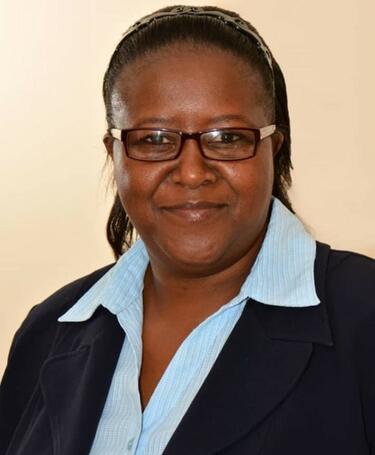
Championing quality in Zimbabwe
Progress indicator

Tazviona Lois Ngonyamo PCQI, Quality Assurance Executive at Irvine’s Zimbabwe, discusses her journey into quality, having recently become a member of the CQI.
What was your journey into quality?
The early stages of my career was as an animal scientist at Irvine’s Zimbabwe. I was always drawn to the processes that ensure the highest standards of quality in the chicken and eggs that we produced at Irvine’s Group. This natural inclination led me to pursue a path in quality assurance (QA), where I could channel my skills and dedication towards making a tangible impact.
My first role in QA was as a junior QA Manager at Irvine’s Zimbabwe, where I was introduced to the fundamentals of quality control in the chicken and egg processing plants, and testing methodologies in the veterinary diagnostic laboratory.
Under the guidance of experienced mentors, I quickly learned the importance of internal auditing, meticulous testing, thorough documentation, and effective training and communication. These early experiences were instrumental in shaping my understanding of the QA landscape and igniting my passion for continuous improvement.
As I progressed in my career, I sought out opportunities to expand my knowledge and expertise. I spearheaded teams in pursuing certifications in various quality management systems (QMS) and QA methodologies and tools, which equipped me with the skills needed to tackle complex challenges. My commitment to professional development and my proactive approach to learning allowed me to take on more responsibilities in the Irvine’s Group and lead QA initiatives within the region.
Today, as a seasoned quality assurance practitioner, I am proud of the path I have taken and the impact I have made. My journey has been marked by continuous learning, perseverance, and a relentless pursuit of excellence. I am excited to continue this journey, embracing new challenges and opportunities to further enhance the quality of the products and services I am involved with.
What does your role as a Quality Assurance Executive involve?
I lead a team of internal auditors in managing the audit programme, planning and executing internal audits in the Irvine’s Group, and ensuring timely closure of nonconforming issues and resolution of customer complaints.
I lead the quality managers who are responsible for maintenance of the food safety management systems in the hatchery, the feed mill and the processing plant, and the QMS in the laboratory.
I also lead the team of scientists working in our QC testing laboratory, and the OSHE team in developing and implementing the occupational health and safety policies and safe work procedures in the workplace, and in establishing a safe work culture throughout the organisation.
I’m also responsible for formulation and documentation of quality policies and standards, and for ensuring legal compliance in the organisation.
In your experience, how is quality perceived in your country?
Food safety is a key issue in Zimbabwe. Key issues affecting food production include but are not limited to; lack of investment in food safety regulations and enforcement, inadequate infrastructure for food storage, distribution, income inequality, inadequate access to clean water, and increase in food fraud activities.
In addition, there is the challenge of inadequate cold chain infrastructure, traceability systems, limited adoption of digital tools for food safety monitoring and lack of awareness of advanced food safety practices.
"Interacting with professionals from more developed countries gives you the advantage of exposure to emerging trends and developments, making you better prepared for these when they come to your country."
The use of standards by companies and organisations in Zimbabwe is an area which has great potential for growth, with the informal sector being the largest employer over the last four decades, suppressing productivity growth and long-term development. According to statistics from the World Bank, presently, informal activity accounts for nearly two-thirds of Zimbabwe’s output, and four-fifths of its employment.
Key social factors in the nation include limited awareness on food safety standards by producers and consumers and income disparities. Small and medium-sized enterprises are also faced with high costs of certification and compliance.
Why is quality important and what impact does your role have?
I play a big role in my organisation in the formation and maintenance of a strong quality culture, that has influenced the strength of the Irvine’s brand reputation. Food safety is a crucial issue – a break in the hazard control systems can actually cost a consumer’s life.
I see my job in quality as important in reducing the risk of contamination and foodborne illnesses. I also play a crucial role in maintaining compliance status with regulatory requirements.
Nationally, I see my job as particularly important in the area of advocacy. Promoting the development and use of relevant standards that sustain economic transformation will go a long way in contributing towards informal productivity growth, making the country more competitive on the regional and international trade platforms.
You are also a sustainability champion at your organisation – could you tell us what that involves?
Irvine’s Zimbabwe is a subsidiary of Innscor Africa Limited, which is listed on the Victoria Falls Stock Exchange. In terms of the law, we are expected to disclose our environmental, social and governance (ESG) compliance with sustainable ways of doing business.
I play a vital role in promoting and driving sustainability initiatives within the organisation. I raise awareness through training, developing and implementing sustainability strategies, policies and procedures, as well as monitoring and reporting progress on the organisation’s sustainability performance, and also engagement with our stakeholders – suppliers, customers, regulators and government.
You are Board Chairman of the National Standards Users’ Society in Zimbabwe – tell us about the organisation and what your role involves.
We have an advocacy role of promoting the use of standards in Zimbabwe. The National Standards Users’ Society of Zimbabwe (NSUSZ) is also the national voice of all standards users in Zimbabwe. It helps standards users stay informed about developments in standards and their implementation. It also helps standards users stay informed on the benefits of using standards, based on the practical experience of others who have success stories to tell.
The NSUSZ therefore provides users’ views and needs to the Standards Association of Zimbabwe (SAZ) to promote effective participation in standards development and their implementation. The NSUSZ assists organisations in taking advantage of standardisation and improving a country’s capability to access global markets.
When and why did you decide to join the CQI?
I found out about the CQI on LinkedIn in March 2024. The few articles I read then drew my interest and my desire to link up and network with others in my field of interest that drove me to apply to be a member.
How did you find the process of becoming a Chartered member of the CQI and how did the CQI support you with this process?
I did not struggle at all. My application was well-received, and every time I sent in a submission there was a prompt response, guiding me on the next steps to take until eventually my application was successful.
What is your next career goal or milestone that you are now working towards?
I’m aiming to register as a certified auditor with IRCA. Long term, I would like to become a consultant, training and auditing food safety management systems.
What advice would you give to other quality practitioners based outside of Europe who are thinking of joining the CQI?
You get an opportunity to discuss quality strategies, sharing insights or collaborating on impactful initiatives. Interacting with professionals from more developed countries gives you the advantage of exposure to emerging trends and developments, making you better prepared for these when they come to your country.
You can also access the latest opinions, thought leadership pieces, case studies, tools and continuing professional development articles.
The benefits of CQI membership
Learn more about the benefits of being a CQI member and how to apply.
Become an event partner for Quality Live 2025
Raise your organisation's profile with our audience of international quality and auditing professionals
Quality World

Get the latest news, interviews and features on quality in our industry leading magazine.


